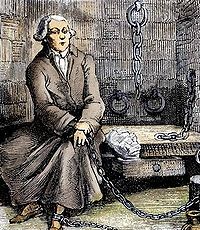Atheism and socialism

The Acton Institute states concerning atheism and socialism:
| “ | ...a growing body of research reveals that as the welfare state grows, the church shrinks. Adam Kay of Duke University discovered that church and state have a “hydraulic relationship”: Events “that lower faith in one of these external systems (e.g., the government) lead to subsequent increases in faith in the other (e.g., God).” Another study found that increased welfare spending “in a specific year predicted lower religiosity one to two years later.” It concluded, “The power and order emanating from God can be outsourced to the government.”...
...faith in the transcendent gets crowded out by faith in socialism’s utopian promise of equality-of-outcome on earth. This path transformed Michael Harrington from a daily communicant volunteering in the Catholic Worker movement to the atheistic founder of the Democratic Socialists of America.[1] |
” |
Andrew R. Lewis and Paul A. Djupe wrote in FiveThirtyEight:
| “ | The conventional wisdom is that the individualist, evangelical style of American religion is a strong antidote to socialism. If faith alone can lead you to salvation, then efforts to reshape society are beside the point. But the animosity between them has been more pointed, especially regarding so called “Godless communists” who portrayed religion as the “opiate of the masses.” In these data, those who agreed that social problems would be resolved if enough people had a personal relationship with God were 20 percent less socialist than those who disagreed. A worldview that pits faith directly against collective action explains clearly why collectivist efforts have traditionally foundered in the U.S.
By the same token, Americans who are not religious (sometimes called the Nones) would be those most likely to hold socialist values. And indeed, this is what we find: Nones are 10 percent more socialist, on average, than religious Americans. The gap is greater among older people (15 percentage points at retirement age) and smaller among the young (5 percentage points at 18-24), perhaps because younger people are exposed to many more Nones and to greater economic insecurity than their elders. In what may be seen as a cruel irony given Sanders’s difficulty with black voters, there is no such gap among nonwhite respondents — support for socialist values is high across the board. Even more, nonwhite respondents favor socialist values at equivalent levels as white Nones.[2] |
” |
The Heritage Foundation declares about atheism and socialism:
| “ | What most millennials mean by “socialism” seems to be a mix of our welfare state and what they perceive to be Swedish democratic socialism. But Sweden and the other Scandinavian countries including Denmark favor the free market and are content with private rather than government ownership of their major industries. However, Danish domestic spending including comprehensive health care has a high price — a top personal income tax of 57 percent.
Socialism in all its forms — Marxism-Leninism in the Soviet Union, Maoism in China, “state socialism” in India, “democratic socialism” in Sweden, National Socialism in Nazi Germany — has never come close to realizing the classless ideal of its founding father, Karl Marx. Instead, socialists have been forced to adopt a wide range of capitalist measures, including private ownership of railroads and airlines (United Kingdom), special economic zones (China), and open markets and foreign investment (Sweden). Marx was an atheist socialist who insisted that his was the only “scientific” socialism based not on wishful thinking but the inexorable laws of history. The whole of history, declared Marx and his close collaborator and friend Friedrich Engels, is the history of the class struggle between the proletariat and the bourgeoisie. The inevitable collapse of capitalism and the victory of the proletariat would end the conflict and usher in a classless society and pure socialism or communism (Marx used both terms interchangeably)... There were the costs in thought control. The content of everything in print and broadcast was limited to authorized “truths.” The Soviet press dismissed the 1932-33 forced famine in Ukraine that took the lives of seven million innocents as an anti-communist myth.... This is the reality of socialism — a pseudo-religion grounded in pseudo-science and enforced by political tyranny. This is the case against socialism — a god that failed, a science that never was, a political system headed for the ash heap of history.[3] |
” |
Julian Strube, a postdoctoral research fellow in Religious Studies at Heidelberg University, wrote:
| “ | For most people today, socialism is associated with a secular or atheistic worldview. Since the October Revolution of 1917, most socialist regimes have built on Marxist doctrines, and taken clear anti-religious stances. From another perspective, however, secular or anti-religious socialism is exceptional, and religious socialism common. The vast majority of the socialist predecessors of Karl Marx and Friedrich Engels were acutely religious. Especially in France, socialists found religion integral to their political vision...
Early socialists sought to create a ‘synthesis’ of religion, science and philosophy to counter the excesses of the Enlightenment. They saw the Enlightenment, and the French Revolution, as needing correction against a tendency to materialism, atheism and egoistic individualism.[4] |
” |
Contents
Atheism, socialism and abortion
See also: Abortion and atheism and Atheism and hedonism and Atheism and sexual immorality articles and Atheism and sexuality and Atheism and morality

The Acton Institute wrote about the agnostic Aldous Huxley and atheism and socialism:
| “ | Huxley wrote that he and “most of [his] contemporaries” saw atheism’s moral vacuum as their “instrument of liberation,” because it allowed them to embrace sexual hedonism and socialism...
More than a generation later, a young American radical reiterated to William F. Buckley Jr. that the locus of the struggle lay in the soul. “You have to change the conscience of people,” Dotson Rader, a onetime revolutionary who went on to write celebrity profiles for Parade magazine, told Buckley during a 1972 episode of Firing Line. “You’ve got to change people’s sexual attitudes, people’s attitude towards the church, people’s attitude towards education, towards business.” He admitted that drug use, “sexual promiscuity and sexual deviancy is a device,” because they create “natural allies to a revolutionary movement.”[5] |
” |
William Dodd wrote in his essay Socialism, Atheism, and Abortion
| “ | The common thread that unites the social engineers and the implementers who followed is atheism. The state-supported practice that has become socialism's identifying mark is abortion. For those who promote and operate the abortion industry, with no belief in God or in an afterlife, accepting the notion that abortion does no harm to anyone is understandably easy. There have been over 1.5 billion abortions worldwide since 1980. So an ironic flaw of this atheistic scheme has emerged: the socialist emancipation of mankind from God is facilitating part of mankind's own destruction.
The growing divide between national political parties certainly is about abortion. But it is also about the Democratic Party's attempt to integrate Scientific Socialism of which abortion is emblematic into our political system. Neither this strain of socialism nor abortion is compatible with the beliefs and practices of our free enterprise system — a system based on trust in God.[6] |
” |
Quote relating to atheism and socialism
See also: Atheism quotes
- "I myself believe that the duel between Christianity and atheism is the most important in the world. I further believe that the struggle between individualism and collectivism is the same struggle reproduced on another level." - William F. Buckley, God and Man at Yale: The Superstitions of "Academic Freedom"[7]
See also
Essays:
External links
- Socialism and atheism – why do they go together? by Rabbi Daniel and Susan Lapin
References
- ↑ How Socialism Causes Atheism – OpEd
- ↑ Americans May Be Too Religious To Embrace Socialism by Andrew R. Lewis and Paul A. Djupe, FiveThirtyEight
- ↑ What Americans Must Know About Socialism
- ↑ How socialism helped to seed the landscape of modern religion by Julian Strube
- ↑ How Socialism Causes Atheism – OpEd
- ↑ Socialism, Atheism, and Abortion by William Dodd
- ↑ God and Man at Yale: The Superstitions of 'Academic Freedom', by William F. Buckley
